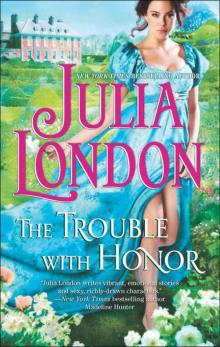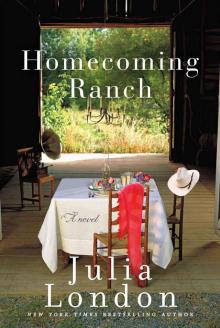- Home
- Julia London
Wild Wicked Scot Page 11
Wild Wicked Scot Read online
Page 11
After the disaster of the ball he’d tried to give her, she knew what to expect. Singing in a language only Highlanders understood and dancing chaotic reels with a lot of hopping about and kicking of legs that the Scots seemed to prefer. He meant to intimidate her with this so-called celebration.
But Margot wasn’t going to allow that to happen. If her husband wanted her to dance and sing to prove herself to him, then she would oblige him, and in high style, too. She might be the most ungainly dancer, but she would console herself by being the most finely attired one.
Margot and the beast Sweeney had saddled for her thundered into the bailey, and Margot managed to slide off without revealing too terribly much of her leg to the groom who had run out to attend her. She straightened her skirts and her bodice...and noticed that her hair had come undone. She was trying to tuck it back into its pins when Jock came striding out of the castle doors. The lad Arran had sent up to inform Fergus of the celebration was close on Jock’s heels.
Jock slowed his step when he saw Margot. He clenched his jaw as he passed by.
Margot muttered a few choice words about Arran’s ridiculously loyal cousin, gave up on her hair and stalked inside. As if her day could possibly get any worse, Pepper and Worthing were just emerging from the hall when she entered, their wigs freshly powdered and their lace cuffs and neck cloths pristinely white. Frankly, they looked ridiculous in this rugged Highland castle.
“Dear God,” Mr. Pepper said, his gaze sliding down Margot and up again. “Have you been assaulted?”
“Assault—No!”
“Then what has happened?” he asked, holding up his hand as if to keep her at a distance.
“Nothing! I’ve been riding and I... Never mind,” she said.
“Madam, if I may,” said Worthing. He stepped closer, glanced around and said softly, “He cannot turn you out and send you to England, not without consequence. There are laws governing marriage.”
“Laws!” Margot snorted. “What law is it that prevents a man from banishing a wife who once abandoned him, sir? Don’t speak to me of laws—men may do as they please. But you may rest assured he is not turning me out. We’ve had a slight misunderstanding, that’s all, and everything has been set to rights.”
Her two keepers exchanged a dubious look.
She suddenly wished these two men were not here to complicate her return. “When did you say you’d be returning to England?”
Worthing frowned. “We did not,” he said. “But I shall be more than happy that we take our leave when you have a message for your father. Have you any message for him, Lady Mackenzie?”
“As a matter of fact, you may hasten back to tell his lordship that I’ve arrived safely at my destination. I’m certain he’s on tenterhooks waiting for that word.” She smiled, dipped a pert curtsy and stepped around her keepers.
When she reached her chambers at the top of a long and winding staircase—rooms she had chosen when she’d first married Arran, insisting that it was proper for a lady to have her own set of rooms, and finding those as far from her husband as she possibly could—she found that Nell had finished the unpacking.
Her maid was sitting in a chair, her feet up on an ottoman. She started so badly when Margot threw open the door that she fell haphazardly out of the chair. “I beg your pardon!” she said frantically as she righted herself and her lace cap. “I meant only to rest my back—”
“Be easy, Nell. I don’t care,” Margot said. “Mackenzie intends to have a soiree of the Scotch variety tomorrow evening. I’ll need my best gown. One that is entirely unforgettable.” She had no doubt that every eye at Balhaire would be on her, searching for the reason she’d returned.
“Ah,” said Nell. She nodded, understanding. “The blue mantua, with the birds embroidered on the stomacher.”
“Yes, that’s perfect,” Margot agreed. The gown had been made for her in London. Tiny birds fluttered about the stomacher in vivid colors. The damask pattern of the silk gown had been sewn with both gold and silver threads so that when Margot moved, it looked as if the skirt was rippling around her.
“Anything else, mu’um?”
Margot looked around her. “Yes,” she said thoughtfully. What a silly choice to have taken these rooms! She’d always felt like a bird in a cage up here, at the top of a tower. It was true she had a stunning view of the castle and the lands around it, which she supposed had drawn her to this room in the beginning. She could even see the sea from here. But she couldn’t hear a sound—not a voice, not a sheep’s bleating, not even a barking dog. She was practically suspended above the world, isolated from all the Mackenzies.
Arran had wanted her to share his chambers. He’d made a set of rooms adjoining his master’s chambers available to her for sitting and dressing, but Margot had been too prim, too proper and, God, so naive.
Well. She was no longer that foolish girl.
She looked at Nell and winced apologetically. “We must change rooms.”
“Pardon?” Nell asked disbelievingly.
“I have put us away from everyone by taking these rooms. I am too far from my husband. How can I possibly be expected to repair anything when I am, for all intents and purposes, in another house altogether?”
Nell looked as if she might collapse.
“Now, Nell,” she said, taking her maid’s hand and caressing it. “I know you’ve done quite a lot of work. But I will tell you in confidence that my husband is displeased with me for having ever left Balhaire, and he means to send me back to England straightaway. I can’t allow that to happen.” Not yet, anyway.
“Aye, milady,” Nell said morosely.
As Nell began to work to repack her things, Margot went in search of Fergus to inform him she would be changing rooms. She found the older man in the great room, overseeing the preparations for the evening meal. He tried to avoid her gaze as she walked in, but Margot knew what he was about and stopped him with a cheerful, “Good afternoon, Fergus.”
“Milady.”
“I thank you for airing out my old rooms on such short notice. But I’ve decided that I should like to be closer to my husband. Would you please ready the sitting room and dressing room adjacent to the master’s chambers? Nell is packing my things.”
Fergus blinked. And then his eyes narrowed on her. “Next to the laird,” he said, as if she’d misspoke.
“Yes, that’s right,” she said calmly. “Next to my husband. Good heavens, you do look alarmed, Fergus. Will it help if I give you my word I’ll not murder him in the night?”
Fergus’s eyes narrowed more. “No, it doesna help. I canna do so without speaking to the laird himself, aye?”
“Of course you can!” she said cheerfully. “Because I am mistress here. And besides, I’ve already spoken to him, and he was pleased with my decision.”
Fergus’s eyes narrowed into little slits. “I donna think—”
“Do as the lady asks,” said a deep male voice from behind Margot.
She should have known Jock would be lurking somewhere close by. Wasn’t he always? She glanced over her shoulder. “There you are,” she said. “I had begun to fret you’d gone missing.”
“Go, then,” Jock said to Fergus.
“That was unexpectedly helpful of you,” Margot said as Fergus went on.
“No’ at all. It’s a wee sight easier to keep an eye on you there than in your tower, aye?”
“So you may think, my friend,” Margot said, and walked away from his piercing gaze.
Unfortunately, with no occupation, no task, no role to play, Margot found herself in the bailey once more. She had no idea where she was going, but she lifted her chin and walked through.
No one stopped her. Most hardly noticed her—that, or they were taking great pains to avoid looking at her.
She wasn’t as wretc
hed as that, was she? Was it truly so condemnable to have left an impossible husband? She was determined to prove that she was not the witch they clearly thought she was. Just how to do that would require some thought.
She walked down the road, where shops and houses had sprung up over the years, forming a small village around the walls of Balhaire. She had rarely come out here before—these were not the sorts of shops she was accustomed to frequenting. There were no silks and china here. No gloves of the finest leather like she wore now.
But one shop caught her eye as she walked down the road. It had boxes of peonies beneath the window, and a wooden sign that proclaimed Miss Agnes Gowan, Proprietress.
A tiny bell twinkled as she stepped through the low door into the building. Something smelled quite delicious, and there, on the counter, was a tray full of freshly baked muffins that made her mouth water. There was a variety of goods and staples—jars of jam, china plates and cups. Sachets of bath salts and milled soaps. Margot picked up a sachet and held it up to her nose. It smelled of heather and lavender.
The sound of whispers brought her head around. Two women had appeared behind the counter, one of them short and round, with a lace cap over gray curls. Margot recognized her from before—she’d been one of the ladies from the kirk she’d tried to involve in charity.
The other woman, whispering into the shorter one’s ear, was younger but had the same bulbous nose. She, too, wore a lace cap and an apron. A daughter, no doubt.
“How do you do?” Margot said pleasantly.
Neither of the women spoke.
“The scents of your sachets and soaps are lovely. I believe the last time I was here, people were still using nettles to clean.” She smiled.
Nothing.
Margot cleared her throat. “You remember me, do you not, Mrs. Gowan? We met when I was last at Balhaire. We spoke of collecting alms for the poor.” Except that they had never collected any alms. None of the ladies of the kirk seemed to understand that raising money to assist the poor was a worthy cause. We take care of our orphans here, they’d said. But Margot had insisted. She’d assumed it was necessary. She had always been involved in charitable endeavors on behalf of Norwood Park and assumed it was expected of her here.
It was Griselda who had finally informed her, quite impatiently, that there was no need to raise alms, as the poor were taken care of within the clan itself. “That’s what a clan is,” she’d said irritably. “We mind our own.”
“Aye, I remember,” Mrs. Gowan said coolly, her gaze narrowing slightly. She made no effort to greet Margot.
Margot lightly traced the gold leaf on a china plate beside her. “I don’t recall such porcelain being available here. Wherever did you get such exquisite china?”
“From France,” the daughter said. “The laird give it to us to sell.”
Gave it to them to sell? “It’s beautiful.” She looked around. “You have so many fine things. The ships from France must come often.”
Mrs. Gowan shrugged and folded her arms as if she were uncomfortable.
“A ship came last night,” her daughter offered helpfully, earning a glare from her mother. The daughter pressed her lips together and looked down.
Was the ship meant to be a secret?
“Well. I’m quite impressed with your wares. I should like some soaps and bath salts to be delivered up to the castle, if you please. You may tell them Lady Mackenzie requested them and have them pay you.” Margot smiled with pleasure at her good deed. That ought to satisfy Mrs. Gowan. Surely the woman would be thrilled to have an order for goods from the laird’s own wife. Shopkeepers always like to have their wares in the finest houses. In the village near Norwood Park, shopkeepers practically sought her out, so desperate were they to have this candelabra or that chair at Norwood Park.
But Mrs. Gowan did not move as much as a finger.
Margot tugged uncertainly on her earlobe. “A selection of your choosing,” she offered helpfully.
“Milady,” the younger one said, and dipped a curtsy. She stepped out from behind the counter and began to gather a selection of soaps and sachets.
But Margot kept her gaze on Mrs. Gowan. Why was she casting such a cold glare at her? Perhaps she didn’t care for Margot’s money, but why be unpleasant to the laird’s wife? Didn’t she realize Arran would hear of it? She couldn’t possibly still be upset about the charity.
As her daughter wrapped the soaps and sachets, Margot said, “I beg your pardon, Mrs. Gowan, but I’ve clearly done something to displease you.”
“Aye, you have,” she readily agreed.
“Ma,” the girl whispered. Her mother paid her no heed.
“Is it the alms? On my word, I truly meant to help. I didn’t know about Highland clans,” Margot said, pressing a hand to her heart.
Mrs. Gowan and her daughter exchanged a look. “The what?” the older woman asked, squinting at Margot again.
Margot could feel her face turning red. “If your displeasure with me does not stem from the charity, how can you be so clearly cross with me?” she asked. “I’ve only just returned to Balhaire.”
“Well, that’s just it, is it no’?” Mrs. Gowan asked.
“Pardon?” Margot asked, taken aback.
“I donna know how it is where you come from, milady, but here, when you wrong a Mackenzie, you wrong all the Mackenzies. And I’m a Mackenzie through and through. My son was schooled alongside the laird, he was.”
“Ma, please, no’ another word,” the girl begged her.
“I’ll say what I will,” Mrs. Gowan said. “I’m no’ afeared of her, I’m no’.”
“I’m not afraid of you, either,” Margot said. “You may be surprised to know that I rather believe the wrong was done to me. And yet it should hardly matter to you, because whoever has been wronged is a private matter between me and my husband.”
“I would that you’d never come back, aye?”
Margot and Mrs. Gowan’s daughter gasped at the same moment. Margot had never been addressed so bluntly. She opened her mouth to warn the woman she’d best not ever speak to her again in that fashion, but Mrs. Gowan said, “I donna know why you did. I hope to never see the laird so pained again, no.”
Margot stilled. Her retort flew out of her head as she stared at the woman. “Pained?” she echoed incredulously.
“Aye, pained, that he certainly was,” Mrs. Gowan said angrily. “Moping about like a cow lost its calf.”
“Ma!” the girl cried.
Margot swallowed down her shock. She glanced around the room, uncertain what to say. Uncertain if she even understood what the woman meant, or if she should even believe something so outlandish. Arran had been angry, very angry. But he’d not been pained.
She looked sidelong at Mrs. Gowan again, whose round cheeks had turned slightly pink. “Do you mean to imply that the laird was pained by his marriage to me?” she asked uncertainly.
“No,” the woman said, her gaze raking over Margot. “He was pained by your leaving us! Everyone could see it, aye? He’d no’ speak of it, but it was mighty plain to me that ye right broke his heart!”
A chill went up Margot’s back. “No, I didn’t,” she said defensively.
“Completely dispirited, he was,” she said emphatically. “And I’ve no use for a woman who can do that to our Mackenzie, no, I donna.”
Her daughter spoke sternly in Gaelic to her mother.
Her mother glanced reluctantly at her girl, then at Margot once more. “I’ve said what I will. I’ll have the soaps sent up to you, then,” she said, and turned away.
Margot was speechless, reeling from the idea that Arran could have been brokenhearted. She backed up, her hand groping behind her for the door, and stepped out of the shop.
Once outside, she stood with her gaze fixed on the hills beyond
Balhaire. She had assumed, given the tension between them, that Arran had been happy to see her go. When her father told her that she must come back to Balhaire, Margot had thought only of how displeased Arran would be to see her again. But pained? Was that true? Had she really pained him, or had this woman interpreted his foul mood as hurt? Wouldn’t Margot have known if Arran wanted her to stay? Would he not have asked her to stay?
She was still standing there trying to sort things out when a group of men came thundering onto the main road on their way to the castle. Several people came out of their houses and shops to have a look. Margot stepped back, flattening herself against the wall of Mrs. Gowan’s shop as they rode past.
She closed her eyes against the dust and opened them again as a lone rider reined to a hard stop.
It was Arran. He stared down at her as his horse danced impatiently beneath him. “Margot? What are you doing here?”
“Ah...” She glanced at the door of the shop. “Mrs. Gowan has kindly agreed to send up a few things to the castle.”
Arran glanced at the shop, then at Margot. “You’ll make do without me tonight, aye?” he said brusquely. “I’ve business in Lochalsh.”
Business in Lochalsh? What business might he have there? It was a tiny hamlet on the western shore with only a few fishermen. “You’ll be away?” she asked plaintively. “But I thought we might—”
“You donna mean to complain of it, surely,” he said, his voice full of warning.
Margot clenched her jaw to keep from doing precisely that. “Not at all. I wish you a safe journey,” she forced herself to say.
“Aye, exactly as I thought.” He spurred his horse on.
Margot watched him go, hating the suspicion rising up in her. With a sigh, she began to trudge back up the hill to the castle, waving away the dust the horses had kicked up.
CHAPTER TEN
AT THE END of the very long day, after dining with Nell in the sitting room adjacent to the master’s chambers, Margot retired to Arran’s bed.

 A Royal Kiss & Tell
A Royal Kiss & Tell You Lucky Dog
You Lucky Dog The Devil in the Saddle
The Devil in the Saddle The Trouble with Honor
The Trouble with Honor Tempting the Laird
Tempting the Laird The Secret Lover
The Secret Lover A Light at Winter’s End
A Light at Winter’s End The Charmer in Chaps
The Charmer in Chaps Homecoming Ranch
Homecoming Ranch Jack (7 Brides for 7 Soldiers Book 5)
Jack (7 Brides for 7 Soldiers Book 5) A Courtesan's Scandal
A Courtesan's Scandal Hard-Hearted Highlander--A Historical Romance Novel
Hard-Hearted Highlander--A Historical Romance Novel The Complete Novels of the Lear Sister Trilogy
The Complete Novels of the Lear Sister Trilogy The Last Debutante
The Last Debutante Suddenly Single (A Lake Haven Novel Book 4)
Suddenly Single (A Lake Haven Novel Book 4) Seduced by a Scot
Seduced by a Scot Highlander Unbound
Highlander Unbound Suddenly Dating (A Lake Haven Novel Book 2)
Suddenly Dating (A Lake Haven Novel Book 2) The Bridesmaid
The Bridesmaid The Seduction of Lady X
The Seduction of Lady X One Mad Night
One Mad Night Extreme Bachelor
Extreme Bachelor The Scoundrel and the Debutante
The Scoundrel and the Debutante The Revenge of Lord Eberlin
The Revenge of Lord Eberlin American Diva
American Diva The Lovers: A Ghost Story
The Lovers: A Ghost Story The Hazards of Hunting a Duke
The Hazards of Hunting a Duke Return to Homecoming Ranch (Pine River)
Return to Homecoming Ranch (Pine River) The Perils of Pursuing a Prince
The Perils of Pursuing a Prince Highlander in Love
Highlander in Love The Devil Takes a Bride
The Devil Takes a Bride Devil in Tartan
Devil in Tartan Wild Wicked Scot
Wild Wicked Scot Snowy Night with a Highlander
Snowy Night with a Highlander One Season of Sunshine
One Season of Sunshine Summer of Two Wishes
Summer of Two Wishes All I Need Is You aka Wedding Survivor
All I Need Is You aka Wedding Survivor Sinful Scottish Laird--A Historical Romance Novel
Sinful Scottish Laird--A Historical Romance Novel Suddenly Engaged (A Lake Haven Novel Book 3)
Suddenly Engaged (A Lake Haven Novel Book 3) Highlander in Disguise
Highlander in Disguise Suddenly in Love (Lake Haven#1)
Suddenly in Love (Lake Haven#1)